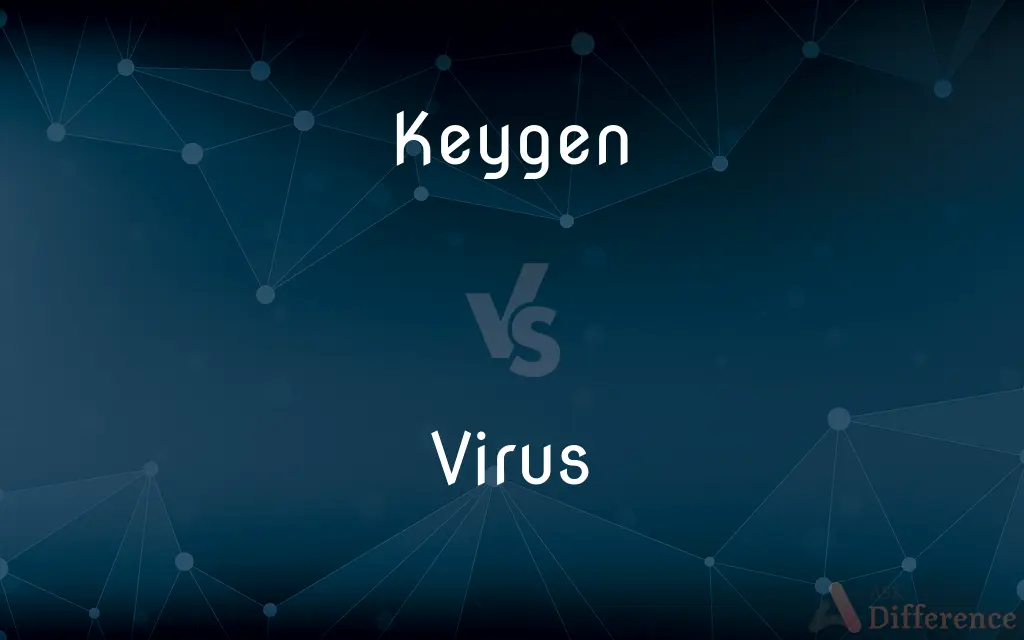Keygen vs. Virus — What's the Difference?
By Maham Liaqat & Urooj Arif — Updated on May 17, 2024
Keygen generates software keys for unauthorized access, while a virus is malicious software designed to damage or disrupt systems.

Difference Between Keygen and Virus
Table of Contents
ADVERTISEMENT
Key Differences
Keygen, short for key generator, is a tool that creates software activation keys. It is commonly used to bypass software licensing and enable unauthorized access to programs. While it can enable access to software without paying, using keygens is illegal and often considered software piracy. A virus, on the other hand, is a type of malicious software (malware) designed to infect and harm computers and networks. Unlike keygens, viruses aim to damage, steal data, or disrupt operations. They spread by attaching themselves to files or programs and can cause significant damage to systems.
Keygens are typically used by individuals looking to avoid software purchase costs, whereas viruses are created by malicious actors intending to cause harm or gain unauthorized access to information. Both pose risks to cybersecurity, but their purposes and impacts differ significantly.
While keygens can occasionally be bundled with malware, including viruses, their primary function remains focused on generating software keys. Viruses, however, do not provide any beneficial functions and are purely destructive or disruptive.
Using keygens can expose users to legal risks and potential malware infections, while encountering a virus can lead to data loss, compromised personal information, and the need for extensive system repairs.
Comparison Chart
Primary Function
Generates software keys
Infects and harms computers
ADVERTISEMENT
Legality
Illegal (software piracy)
Illegal (malicious intent)
Risk
Can be bundled with malware
Directly harmful to systems
User Intent
To bypass software licensing
To damage, steal data, or disrupt
Impact
Unauthorized software access
Data loss, system damage, and breaches
Compare with Definitions
Keygen
A tool that creates activation keys for software.
He used a keygen to unlock the full version of the software.
Virus
Harmful software that disrupts systems.
The IT team worked to remove the virus from the network.
Keygen
A method of software piracy.
Using a keygen is a form of software theft.
Virus
A program designed to cause damage.
His computer was slow due to a virus infection.
Keygen
Program used to bypass software licensing.
The keygen provided access without a valid license.
Virus
Code that destroys data or steals information.
The virus stole sensitive information from the database.
Keygen
Software that generates product keys illegally.
Downloading a keygen is risky and illegal.
Virus
Malware that replicates and spreads.
The virus spread through email attachments.
Keygen
An application that creates serial numbers for programs.
She found a keygen that worked for her video editing software.
Virus
A virus is a submicroscopic infectious agent that replicates only inside the living cells of an organism. Viruses infect all life forms, from animals and plants to microorganisms, including bacteria and archaea.
Keygen
A key generator (key-gen) is a computer program that generates a product licensing key, such as a serial number, necessary to activate for use of a software application. Keygens may be legitimately distributed by software manufacturers for licensing software in commercial environments where software has been licensed in bulk for an entire site or enterprise, or they may be distributed illegitimately in circumstances of copyright infringement or software piracy.
Virus
Any of various submicroscopic agents that infect living organisms, often causing disease, and that consist of a single or double strand of RNA or DNA surrounded by a protein coat. Unable to replicate without a host cell, viruses are typically not considered living organisms.
Keygen
(computing) A small program used to generate a license key used to unlock a trial version of software illegitimately.
Virus
A disease caused by a virus.
Virus
A computer program or series of commands that can replicate itself and that spreads by inserting copies of itself into other files or programs which users later transfer to other computers. Viruses usually have a harmful effect, as in erasing all the data on a disk.
Virus
A harmful or destructive influence
The pernicious virus of racism.
Virus
A submicroscopic, non-cellular structure consisting of a core of DNA or RNA surrounded by a protein coat, that requires a living host cell to replicate, and often causes disease in the host organism; such agents are often classed as nonliving infectious particles and less often as microorganisms.
Virus
(uncountable) A quantity of such infectious agents
Virus
A disease caused by such an infectious agent; a viral illness.
He's got a virus and had to stay home from school.
Virus
(archaic) Venom, as produced by a poisonous animal etc.
Virus
(computing) A type of malware which can covertly transmit itself between computers via networks (especially the Internet) or removable storage such as disks, often causing damage to systems and data; also computer virus.
Virus
Any type of malware.
Virus
(figurative) Any malicious or dangerous entity that spreads from one place or person to another.
Virus
To send or infect an electronic device with a computer virus.
I'm just going to virus anyone who tries cheating on this game.
Virus
Contagious or poisonous matter, as of specific ulcers, the bite of snakes, etc.; - applied to organic poisons.
Virus
The causative agent of a disease, .
Virus
Any of numerous submicroscopic complex organic objects which have genetic material and may be considered as living organisms but have no proper cell membrane, and thus cannot by themselves perform metabolic processes, requiring entry into a host cell in order to multiply. The simplest viruses have no lipid envelope and may be considered as complex aggregates of molecules, sometimes only a nucleic acid (DNA or RNA) and a coat protein. They are sometimes viewed as being on the borderline between living and nonliving objects. They are smaller than living cells in size, usually between 20 and 300 nm; thus they pass through standard filters, and were previously referred to as filterable virus. The manifestations of disease caused by multiplication of viruses in cells may be due to destruction of the cells caused by subversion of the cellular metabolic processes by the virus, or by synthesis of a virus-specific toxin. Viruses may infect animals, plants, or microorganisms; those infecting bacteria are also called bacteriophages. Certain bacteriophages may be non-destructive and benign in the host; - see bacteriophage.
Virus
Fig.: Any morbid corrupting quality in intellectual or moral conditions; something that poisons the mind or the soul; as, the virus of obscene books.
Virus
A program or segment of program code that may make copies of itself (replicate), attach itself to other programs, and perform unwanted actions within a computer; also called computer virus or virus program. Such programs are almost always introduced into a computer without the knowledge or assent of its owner, and are often malicious, causing destructive actions such as erasing data on disk, but sometime only annoying, causing peculiar objects to appear on the display. The form of sociopathic mental disease that causes a programmer to write such a program has not yet been given a name. Compare trojan horse{3}.
Virus
(virology) ultramicroscopic infectious agent that replicates itself only within cells of living hosts; many are pathogenic; a piece of nucleic acid (DNA or RNA) wrapped in a thin coat of protein
Virus
A harmful or corrupting agency;
Bigotry is a virus that must not be allowed to spread
The virus of jealousy is latent in everyone
Virus
A software program capable of reproducing itself and usually capable of causing great harm to files or other programs on the same computer;
A true virus cannot spread to another computer without human assistance
Virus
Malicious software that infects computers.
The virus corrupted all her important files.
Common Curiosities
Can keygens contain viruses?
Yes, keygens can be bundled with malware, including viruses.
What is a virus?
A virus is malicious software designed to infect and harm computers and networks.
How does a virus spread?
Viruses spread by attaching themselves to files, programs, or through email attachments.
Why do people use keygens?
People use keygens to bypass software licensing and access programs without paying.
Is it safe to download a keygen?
No, downloading a keygen is risky and can lead to malware infections.
What is a keygen?
A keygen is a tool that generates software activation keys for unauthorized access.
Can a virus steal personal information?
Yes, some viruses are designed to steal personal and sensitive information.
Are keygens legal?
No, using keygens is illegal as it constitutes software piracy.
Are all viruses detectable by antivirus programs?
Most viruses can be detected by updated antivirus programs, but some advanced viruses might evade detection.
Is it possible to legally obtain software without paying?
Yes, through free trials, open-source software, or software offered for free by developers.
What damage can a virus cause?
A virus can cause data loss, system corruption, and security breaches.
What is the primary purpose of a keygen?
The primary purpose of a keygen is to generate software keys to bypass licensing.
What should I do if my computer gets a virus?
You should run antivirus software and possibly seek professional help to remove the virus.
Can using a keygen harm my computer?
Yes, using a keygen can expose your computer to malware and other security risks.
How can I protect my computer from viruses?
Use updated antivirus software, avoid suspicious downloads, and practice safe browsing habits.
Share Your Discovery

Previous Comparison
Atelier vs. Studio
Next Comparison
Select vs. SelectedAuthor Spotlight
Written by
Maham LiaqatCo-written by
Urooj ArifUrooj is a skilled content writer at Ask Difference, known for her exceptional ability to simplify complex topics into engaging and informative content. With a passion for research and a flair for clear, concise writing, she consistently delivers articles that resonate with our diverse audience.
















































